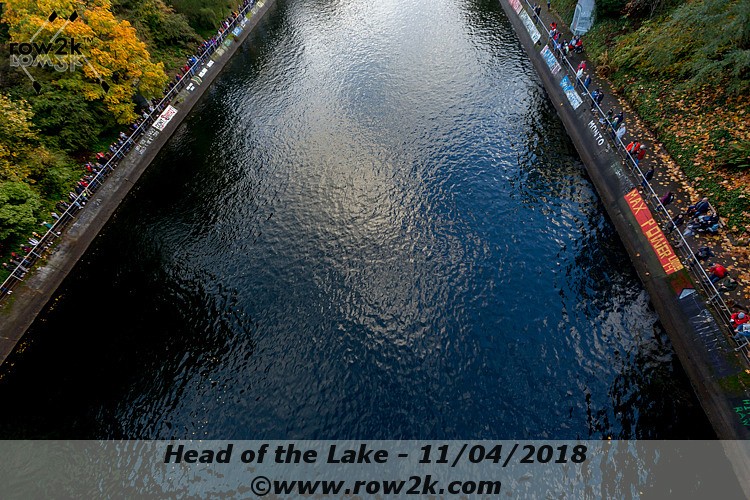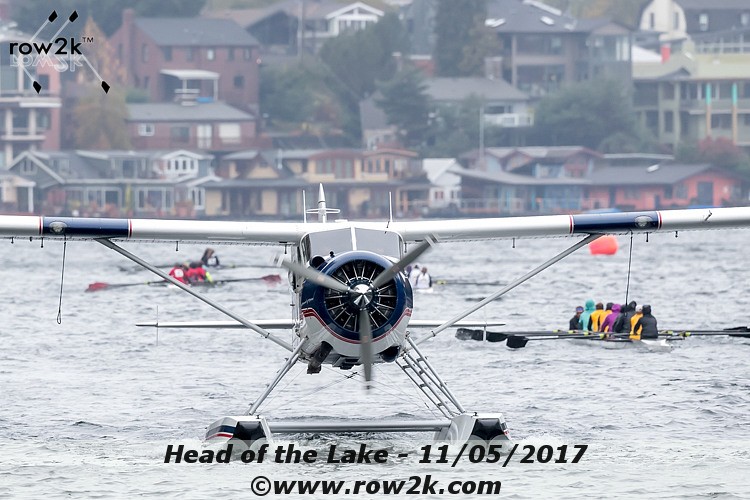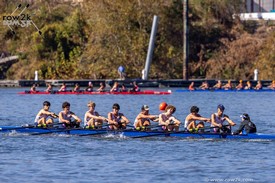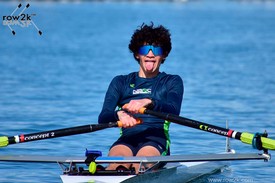
Many years ago, when shells were cedar, oars were spruce, and men dogwood, a contingent of undergraduates rowed out of Seattle’s Lake Washington Rowing Club in a straight four aspiring to avoid dockside duck poop, ducklings, and nun buoys, in order to hit the U.S. National Championships. But after weeks of soiled socks and speedless training, having dismissed their coach, the rowers racked their sweep oars to try sculls—in wherries for the careful, singles for the reckless, doubles for the rest. Of these stalwarts, John Reeve, a dark-eyed, dark-browed, dark-haired and dark-mustachioed oarsman of moderate stature and immense charm, became my partner, and because he had secured summer employment with the Burr Gregory Paint Company which freely distributed white painter's caps, we donned such caps and became the Burr Gregory Paint Double.
Through a convergence of values, mission, and personality rare in our sport, in moments John and I, knowing the importance of goals, formed two for our double—the first: to win the championship doubles race in a now defunct regatta then looming in two weeks; the second: to re-enact the moment of supreme hauteur allegedly committed by Australian sculler Stuart McKenzie during Henley’s Diamond Sculls when, leading his hapless opponent by a significant margin just before The Enclosure, McKenzie stopped, held scull handles with one hand, removed his hat and wiped his brow with the other, and commented, "Not much of a race, is it?" As insurance against any conflict between our goals, we agreed that regardless of our racing position—even if pursuing the second goal threatened the first—hauteur took priority.
Race preparation, as is well known, is a dance of science and art, a careful tuning of physiological and psychological factors to a pitch designed to harmonize with that most remarkable of human achievements: delivering oneself at an assigned place at an assigned time to perform at the limit of one's potential. Without a coach and reeling from our earlier failures, we scanned our knowledge base for a workout schedule to fit our compressed campaign.
That summer a number of people trained from the same boathouse; in fact, we were scarcely welcomed guests, interlopers (three from the East Coast), so we observed the club's norms and tried not to offend. One of the more notable personalities was a solitary sculler whose daily workout consisted of a single full-bore time trial over the 2000m of the course, during which, into the space customarily occupied by a coach, every few strokes he howled deprecating encouragement to himself, encouragement flavored with extraordinary profanity.
Meteorological conditions that summer were consistent: still, dense morning fog that burned off into brilliant afternoon sunshine. As this gentleman rowed mornings only and launched well before we did, our sleepy stance before shoving from the dock's wet and duck-marked boards was ritually accompanied by expletives crescendoing, then decrescendoing, out of the fog.
With no better model, but knowing full well that it violated every tenent of training we had learned, John and I chose to emulate this most committed of scullers. Each morning we warmed up the course with tens, twenties, and starts, turned at the line, rowed 2,000 meters at racing beat (with start and final sprint), brought the boat about, paddled back to the boathouse, and deemed ourselves thoroughly satisfied.
But we were no fools. Concerned that our morning regime might insufficiently prepare us for The Race, we added an afternoon workout. With white hats shading glorious sunlight, we sculled east along and then through Seattle's floating bridge, south a few thousand meters along the shore of Washington Lake, and pulled into the tiny beach below the lawn of the home where I lived that summer. John kept the shell off-rock while I dashed to the house, fetched two beers, dashed back, and away we pushed from shore, clunking our sculls home to their oarlocks. I do not recall how we rowed the double, which requires the uninterrupted use of both hands, and also drank the beer, but there must have been a way, for there was will in excess.
A central feature of the afternoon workout was singing our alma mater's ballad which requires a peculiar waving of the right fist in and out from the chest. I no more recall how we rowed the double doing this than drinking beer, but we did, possibly simultaneously. I do, however, remember an afternoon just before race day when apprehension was waxing; after the final, drawn-out bar, I asked over my shoulder, "John, did I hear you harmonizing there at the end?" We'd never sounded so in tune.
"No," he replied. "I have a cold."
The day of the regatta arrived, as most do, with crappy weather: a cold, wet headwind threatening rain—weather to keep all but oarsmen and ducks indoors. As if the weather were insufficiently discouraging, John and I were soddened to discover that four other crews had the gall to enter our race, some Canadians rumored to be national champions and two doubles from Stanford University featuring some ominously-named characters. We had hoped, obviously, for a row-over, especially as the hat-doffing in a row-over would have howled with irony. But, being the Burr Gregory Paint Double, we adjusted our white caps and admitted that our butts would surely be kicked because no oarsman from Canada or Stanford would have been stupid enough to prepare as we had. We then reaffirmed our commitment to, and the priority of, our goals:
McKenzie hauteur: 1; winning: 2.
We warmed up in the cold wind as we had every morning, the routine comforting our quivering nerves, and arrived on time at a stakeboat sandwiched between the four Stanford gods. They were huge, tanned, muscular, confident, and contemptuously indifferent to us; and why wouldn't they be? Nonetheless, settling to racing beat after a frenzied start, we had open water on the field.
George Pocock, our sport's England-born sage and foundation of American boat-building, is thought to have said, "Rowing a race is an art, not a frantic scramble."
With all due respect, I submit that George Pocock must never have raced—history books be damned. First is the problem of time and space: wherever you might be on the course, it is not where you desperately wish to be (over the finish line), a situation that poisons the entire enterprise with excruciating urgency compounded by time's adamantine indifference to suffering. To this add the anxiety about things that might hinder one's progress to the finish, too numerous to catalog, but certainly including going off-balance; going off-course; going out of the boat, as via catastrophic crab; going upside-down; whacking one's knuckles repeatedly on the gunwale; hitting something in the water such as a buoy, a log lurking beneath the surface, a goose, duck, or swan, a 300-gallon water heater, a bridge abutment, a snake dangling from a tree, a manatee, another boat; snagging something, such as your thumb in your rowing pants' drawstring where you carefully tied your room key, or the tail of your shirt on the bow end of your tracks or your shorts' hem on the stern end of your tracks, or a fishing line, or kelp, or a fish jumping from the water onto the tracks of the rower before you where you can watch the fish get puréed , guts and blood and scales and eyes splattering about—all of which has happened to me, a boatmate, or a rowing colleague. Then there is the foiling wind which must blow unfairly from every direction except the stern unless, as it did in the 1971 world championships in Copenhagen, at 40 knots with mountainous whitecaps in the last 500m (New Zealand won by a deck over East Germany's Wunderkinder). Then add to your boat Other People, not one of whom is within your domain of influence and every one of whom is as mortally vulnerable as you are to momentary clumsiness, inattention, doubt, fear, disillusionment, and exasperation—or heroism as enacted by my classmate Goldie who planned and executed a rallying scream to our crew with 500m to go, in the process throwing himself so far beyond his anaerobic threshold that he suffered the last 499 meters in a gelatinous, anoxic, and enervated haze. And finally, the greatest liability of all: yourself, envenomed with an adrenaline overdose, debilitated by hypoxia as a function of rowing's unique arrangement by which rowers facing backwards, in order to see their opponents, must blast from the starting line at a flat-out sprint, in the process accumulating an oxygen deficiency other racers encounter only at the end of their events. And, because in all but singles and two-rower races the mass of the crew is too great for any individual rower to accelerate the crew alone, the most significant question is not whether you can suddenly do something heroically inspiring and effective but whether you are suddenly going to ruin everything for everybody by being more mortal than they.
So, Mr. George Pocock, you may have experienced a rowing race as an art of grace and splendor, as a symphony in motion, but I have known it only as the most frantic of frantic scrambles, which is exactly how the Burr Gregory Paint Double exploded from its stake boat and then settled, gasping, onto its oxygen-deprived racing pace.
But we were leading! How profoundly confusing. John, I learned later, quickly made the same attribution as I, that, like McKenzie, these Stanford boys were toying with us, allowing us some smug margin so they could storm back in the last 500 to humiliate us before all the screaming spectators. So certain were we of this unspoken attribution that we raced frantically through the entire first 500m to gain as great a safety margin as possible, John expressing his particular form of anxiety by trying to row a few strokes above me.
We had planned a race-breaking, mighty-move at the first nun, one of the massive steel buoys marking the shipping channel on which the course was laid. John in the bow was responsible for steering and coxing—I for shutting up and rowing. So somewhere around 700m gone, I anticipated John's call for our critical move. I could always tell when he was turning to check our course because—and this is unique, in my knowledge, to the Burr Gregory Paint Double—for one entire stroke John would plunge his scull handles down around his ankles and twist in his seat to eye our heading. This left me unpredictably with the full weight of the shell and crew for one stroke, a challenge to my lower back so deeply embedded in my neurological memory that as I write this many years later, my lower latissimus dorsi twitch anxiously.
It was in the middle of one such stroke that John cursed with a tone I had never before heard from him, in equal parts rage and fear. Anticipating the nun and our big drive, imagining we were headed directly for that tapered monster of steel tonnage, I awaited John's urgent shout to way 'nough or roust the shell to port or starboard. Only those who have rowed in fragile, beautiful wooden boats can imagine my confusion and anxiety, building with each stroke in the middle of this insane race with 700 meters gone and two hulking Stanford crews poised to trample us, as John said nothing. His oath hung in the air above my head, enclosed in the bubble of his stunning silence. We squeezed off stroke after stroke.
I then heard something unusual: falling water.
One does not expect, in a rowing race, to hear the sound of heavily falling water: large quantities of water, loud splashing, a cataract of falling water in the middle of a race course—but, being a disciplined sculler with an entirely trustworthy partner in the bow, I kept my mouth shut, my eyes fixed on our snaky wake, and rowed. But the sound grew so loud and wild that when suddenly it was immediately beside my starboard scull, I cracked. I broke protocol. I looked to my left straight into the slipping, riveted wall of blue-gray painted steel and the great snarling bow wake of a United States Navy destroyer escort plunging up the course.

At such a time one learns a great deal about oneself as an athlete, about one's character, and that of one's boatmate. Within seconds we would undoubtedly swamp, probably capsize, probably be sucked into and filleted by the ship's screws, but as I considered this (still racing) I (and John) heard a voice bellowing down from on high like the voice of God: "Take it up! Take it up!" Some wag of an anchor-clanker, no doubt a former Naval Academy oarsman jauntily plowing his vessel straight up the middle of a race and, eager to prove himself a salty oarsman, thinking to relate to us by bellowing straight down from his deck rail through an improvised megaphone.
Simultaneously John and I—what a crew, what a soul-synchronicity!—screamed "Fuck you!" We then clutched our sculls as the ship's bow tsunami hit.
Journalistic integrity requires me to add this report: years later John swore that as the destroyer escort was sliding by, he fulfilled his half of our goal and doffed his cap, calling up to that receding young officer, "Not much of a race, is it?" Rowers have strange relationships to the past, and John may have done as he remembers. My mind was focused to a laser dot on survival, and for all I know he may well have scrambled up and down the decks of our Pocock. Honestly? At that moment I would not have released my death grip on one of my sculls for the largest laugh or the largest trophy in the realm of sweaty, beer-heisting rowers.
At any rate, this I believe: dumbfounded that we'd bobbed it out, we got the bow back on course and began racing again, even more frantically for the diminished gap to the white shirts of the Stanford crews. We took three strokes when the stern wake hit. We’d forgotten about stern wakes.
How disorienting. Our planned massive drive was as swamped by survival concerns as our socks by cold, sloshing water, John taking another course check with me thinking right then it might be good for us to practice steering and rowing at the same time but here we were maybe 1000 meters from the end of the race and the season and what could be done? when John repeated his oath in a tone of even greater outrage, and the entire first encounter with the United States Navy (minus the exchange of greetings) replayed with a second destroyer escort, its bow and stern tsunamis bobbing us like a rubber duckie in a turbulent tub.

If one destroyer escort could follow another, why not three? Or four? But in that moment, having anxiously extended myself in the second 500 to protect against the imminent Stanford stampede, I discovered an antidote to all the world's confusion and discomfort: never looking more off my stern post, all the chaos and mysteries of an unpredictable universe I knitted together with my long sculls, placing them in the water, pulling on them, taking them out, placing them in again and pulling, over and over, with effort: peace in pandemonium.
John, however, no doubt with mounting paranoia eyeing the Stanford crews, suddenly shouted "Sprint! Sprint!"
For those unfamiliar with rowing tactics, the most common race plan involves thirty or so sprinting strokes at the start, one or two drives of ten or so strokes (hence the expression "power ten"), an increase in tempo entering the last 500m, with a final sprint of about 30 strokes. But The Burr Gregory Paint Double had barely reached the 1000m mark, so John was basically calling for a 1000m, 120-stroke sprint, the very idea of which boggles the mind. But in the curious plane of reality to which elements had conspired to lift our crew in a plasma of disbelief and discomfort, familiar metrics melted away. We were pioneers in a realm hitherto unimagined. What I mean is that I had no choice, as stroke, but to follow the command of my bowman/helmsman/coxswain and increase the stroke-rate of the Burr Gregory Paint Double to its highest and least sustainable level.
I don't remember anything about that second 1000m except John's mute breathing hard at my back and his vacations to steer every forty strokes or so... and we entered the Montlake Cut.
The Montlake Cut is a narrow shipping channel permitting maritime transit between Lake Washington and Portage Bay, Lake Union, and the Pacific Ocean. Its embankments of massive granite blocks sit at an angle ingeniously engineered to make waves, such as those created, for instance, by rushing destroyer escorts, climb one embankment without breaking, hurl themselves back down without diminution of height or velocity, plunge across the space to the facing embankment, and repeat the dance in mirror. Vessels, of course, send waves from both bow and stern and in both directions such that when their wakes rip back and forth across the Cut in rebounding encounters, their heights can momentarily become cumulative. Into such a maelstrom did the Burr Gregory Paint Double fling itself.
With regret I report that not once inside the Montlake Cut did we complete a stroke—neither as a double nor as individual scullers. Only agonizingly fading momentum crept us through mountainous chop and past the grandstand with its mute spectator or two, and finally across the finish line, our keel yawing like a vane in strong, variable winds.
With far greater regret must I report that we did not, after all, re-enact Mr. McKenzie's gesture before the grandstand, our magnificent plan having been drowned in mortal terror. Only regaining the dock and then stable earth did we recall our heroic intentions.
And so the Burr Gregory Paint Double racked its slender Pocock cedar shell and its season with only one goal met, and that the less valued.
Through the years of my young career, I had already learned profound lessons to be gleaned from such episodes — lessons in courage and resilience, in taking the "me" out of teamework, in the value of concentration and trust and loyalty in one's boatmates, in giving 110% with every stroke, in pushing the envelope to vanquish pain, in spitting into the face of fate, fortune, and weather, in facing duress, in sustaining discipline and confidence and respect for officials and opponents alike, in mentoring and focusing and preparing, in going above and beyond, in hard work.
On the dock, however, John gave my hand a soggy but firm, slow shake, stared his dark eyes steadily into mine, and said of the whole summer, "What the hell was that?"

If you enjoy and rely on row2k, we need your help to be able to keep doing all this. Though row2k sometimes looks like a big, outside-funded operation, it mainly runs on enthusiasm and grit. Help us keep it coming, thank you! Learn more.
Comments | Log in to comment |
There are no Comments yet
| |
- Bont Rowing
- Calm Waters Rowing
- Concept 2
- Craftsbury Sculling
- The Crew Classic
- CrewLAB
- Croker
- Durham Boat Co.
- Empacher
- Faster Masters
- Filippi
- Fluidesign
- h2row.net
- HUDSON
- Live2Row Studios
- Nielsen-Kellerman
- Oak Ridge RA
- Peinert Boat Works
- Pocock Racing Shells
- Race1 USA
- RowKraft
- Rubini Jewelers
- Vespoli USA
- WinTech Racing
- Bont Rowing
- Calm Waters Rowing
- Concept 2
- Craftsbury Sculling
- The Crew Classic
- CrewLAB
- Croker
- Durham Boat Co.
- Empacher
- Faster Masters
- Filippi
- Fluidesign
- h2row.net
- HUDSON
- Live2Row Studios
- Nielsen-Kellerman
- Oak Ridge RA
- Peinert Boat Works
- Pocock Racing Shells
- Race1 USA
- RowKraft
- Rubini Jewelers
- Vespoli USA
- WinTech Racing

















